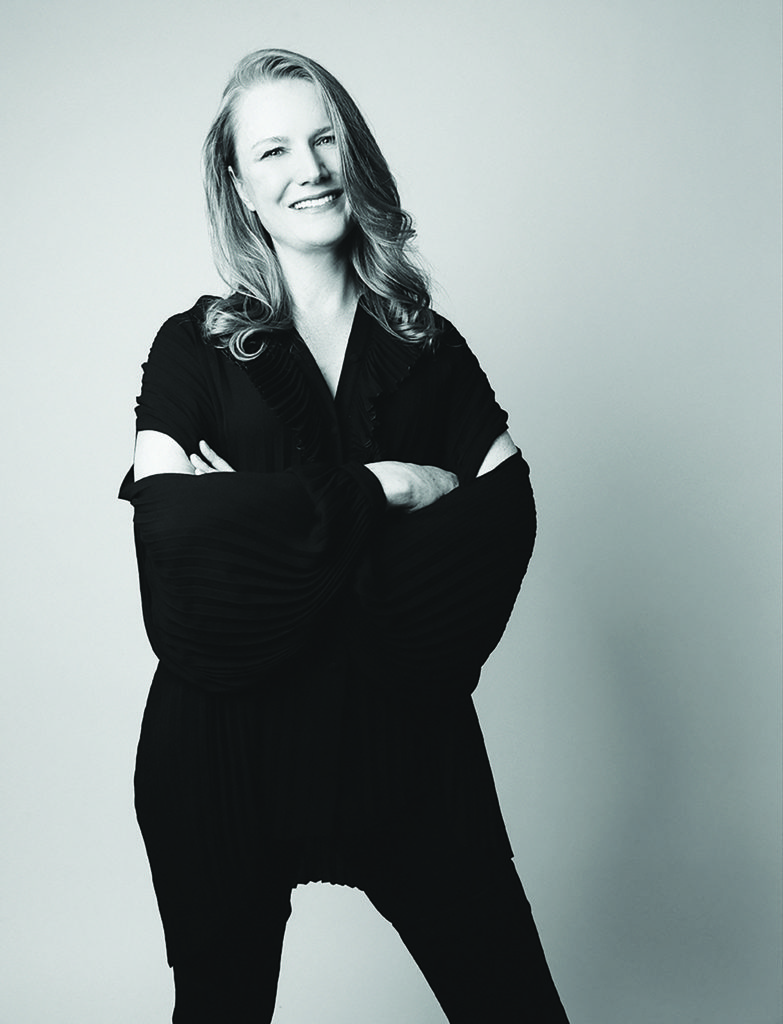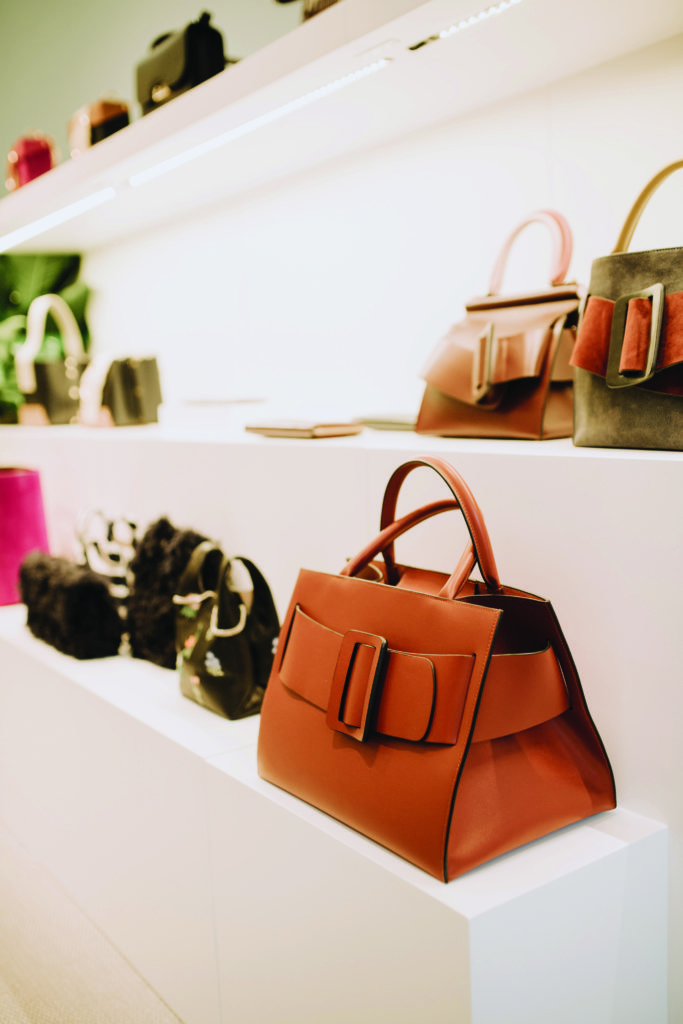
Cristina Cuomo: Before you came up with the Olivela concept, what were you doing?
Stacey Boyd: I’ve started a number of different organizations and companies. I launched a middle school in Boston two weeks after I graduated with a joint degree from Harvard Business School and the Kennedy School. That then turned into a software company, helping parents and teachers communicate more effectively. From there, I launched Schoola, the used-clothing brand. It was my experience with Schoola that gave birth to Olivela. Schoola is still a brand that we run. It’s very different from luxury and what we do with Olivela, but it’s a powerful way for schools to raise money.
CC: Tell me about the root of the name, Olivela.
SB: Olive for olive tree, the symbol of growth and wisdom. Vela, which is Latin for ‘sails of a ship’—with the idea being that we can help set girls on the right path, the world forward on a better path.
CC: What was the concept behind it, initially?
SB: The idea was really simple. I got off a plane with Malala [Yousafzai] and her father, whom I adore, in Dadaab, Kenya, and reached into my bag to take a picture of this incredible group of young women who were getting a distance education through Vodafone and I realized two things: one, that talent is equally distributed, but opportunity is not; and two, more importantly, that a fraction of the cost of the bag that I was grabbing my phone out of could send a girl to school for a year.
It was this moment, when I reached into my bag, and I was running this other brand and we were processing up to 10,000 units a day, that I thought of Schoola. If I could sell $500 to $5,000 items and get to 10,000 units a day, imagine the good I could do. So, I came back and talked to Stella McCartney, Givenchy and Jimmy Choo, an incredible group of brands, and said, what if we create this multibrand retail site with doing good built into every purchase, and they loved it. We launched with 12 brands about a year ago.

CC: Do they create special items just for the site?
SB: We are working on exclusives for the Olivela site. The best way of thinking about us is, we’re really Saks or Net-a-Porter, but with a portion of the proceeds going to nonprofits.
CC: So, the growth potential is incredible, and yet you are one of the few brands that are doing brick-and-mortar, too?
SB: We are doing a combination. About 90 percent of luxury shopping still happens offline, surprisingly enough. Our stores are an experience. It’s an opportunity for us to tell our story, and people respond differently to a brand when they know the story behind it. Both in Nantucket and here in Aspen, we have been able to do some great storytelling, and I think that’s really resonated.
CC: Where are you based?
SB: London is home. A lot of our team is in New York, but we are building a global brand. We have grown, and so has our impact. We gave away 50 times more in December than we did in January of last year, in one year.
CC: Wow. How do you decide what charities you’re going to partner with?
SB: We currently are working with Malala Fund, Too Young to Wed, and CARE, all of whom have an incredible track record in working with girls around the globe. We may expand from there in a small way, but I feel like we have a really great group of charities that we are able to work very closely with.
CC: And then you offshoot Olivela, and create partnerships with charities like the Nantucket Cottage Hospital, where proceeds will go directly to those charities.
SB: That’s right. We obviously have a vetting process for making sure that nonprofits we work with are in good standing.
CC: What do you see happening in five years from now?
SB: My hope is that the majority of the worthy nonprofits out there are ones that we’re partnering with, and are helping raise sustainable streams of funding for them on an ongoing basis. Running a nonprofit is really hard. It’s an annual process where you need to go out and pass the hat. People who run nonprofits spend most of their time raising money, and not on what they do better than anyone else, which is providing the services. Olivela is a sustainable, ongoing revenue source that its supporters and those that support it can do. It’s turning an everyday action into a force for good.
CC: How does it make you feel?
SB: I feel like I’m a big player in a much larger movement, and I feel really lucky to be at a place where I can support both the brands that are doing amazing work, and also the nonprofits that we’re partnered with. We just happened into an idea at the right time, and I feel really lucky to be in the place that I am.
CC: It’s been a year now?
SB: A little over a year. We launched in 2017.
CC: How are sales?
SB: They’re great! It’s been crazy. Our sales this January were 50 times what they were the previous January.
CC: This store is new?
SB: This store is brand-new. We just launched over the holidays. Nantucket, we did last summer, so really our first pop-up was last summer. We’re going to be launching Olivela in LA soon.
CC: And the Hamptons this summer, hopefully.
SB: Yes, exactly.
CC: As a working mother, what you’re doing is so important for your children to witness, because it puts their expectations in the right place.
SB: I feel like our kids’ generation, and the ones a little bit older, are moving through the world in a very different way. Finding a way for their everyday actions to have an impact is really important. I was on the Syrian border almost a year ago today, and I met this incredible young woman who, in the first five minutes, reminded me so much of my daughter. She was standing there, giggling with her friends, and sort of laughing in the way a middle school kid laughs, slightly awkward around adults. Just a classic kid. I asked her how old she was—she was the same age as my daughter. I found out that she had not been to school for three years, she was a Syrian refugee living in Jordan, and was working in order to help her family make ends meet. She is now in school as a result of what we are doing.
CC: What makes you go to these places? Syria, Jordan, Africa, Dubai…
SB: Dubai is its own story [laughs]. The thing that is so fascinating to me is, again, that notion that talent is equally distributed, but opportunity is not—it’s a really profound one, when you take it to heart. You can’t know that and not do something about it, and I am moved by this wonderful girl, Rama, whom I met in Somalia, and the incredible young woman I met on the Syrian border. These girls are going to change the world. They just need the littlest bit of help in order to get on the right path. In Syria, $100 a month can literally feed a family, put a roof over their heads and send a girl to school.
CC: How many schools have you helped fund?
SB: We just crossed the 100,000 days-of-school mark for the girls that we’re supporting around the globe.
CC: Do you support them through scholarships, or do you support the schools?
SB: It’s a combination. In Jordan, we are working with Syrian refugees through our partner, CARE. It’s $1,000 to feed a family, and give the family $100 a month in return for them agreeing to send their daughter to school, because otherwise their daughter would be forced into early marriage. When a girl goes to school, the impact it has not just on her, but on her entire community, ends up being profound. olivela.com



